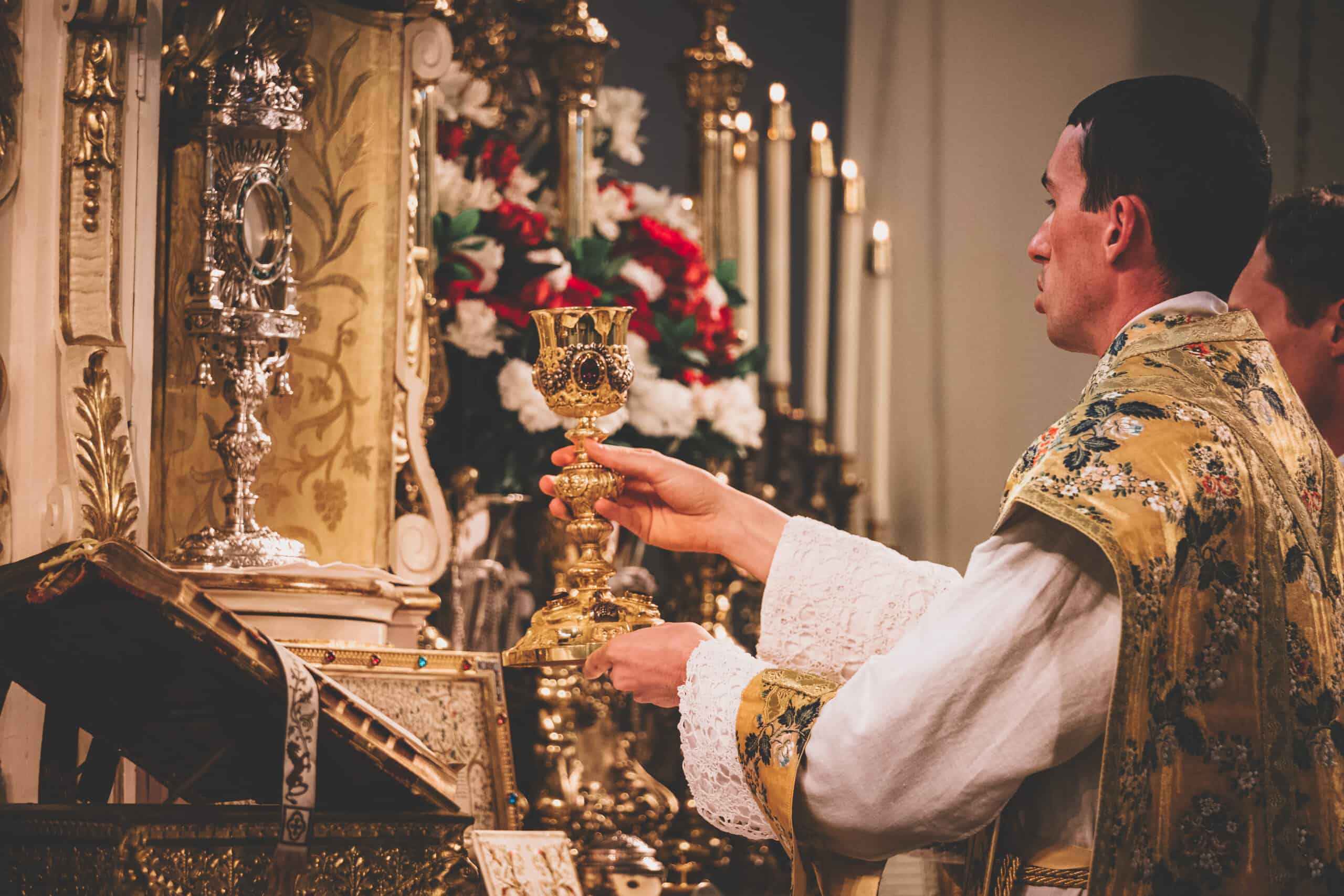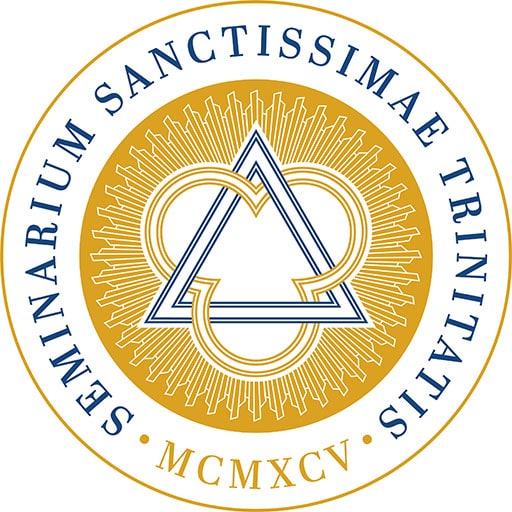
Where is Most Holy Trinity Seminary?
In Fall 2022, the seminary moved to Reading, Pennsylvania.
Who is on the seminary faculty?
The Most Rev. Donald J. Sanborn, The Most Rev. Germán Fliess, Rev. Nicolás E. Despósito, Rev. Damien Dutertre, Rev. Luke Petrizzi, and Rev. Tobias Bayer.
What courses would I take?
In humanities: Latin, Greek, history, literature, music and art appreciation, and English composition. In philosophy: Logic, Cosmology, Psychology, Ethics, Metaphysics, Criteriology, and Theodicy. In theology: Dogmatic Theology, Moral Theology, Canon Law, Sacred Liturgy, Sacred Scripture, Pastoral Theology, Church History, and Homiletics. Special courses: Political Philosophy, Modern Errors, and The New Theology.
How long would it take to become a priest?
About seven years after high school, depending on your knowledge of Latin. Before Vatican II, a high school graduate spent eight years of study in the seminary before ordination: two years of humanities, two years of philosophy, and four years of theology. Because of the need for priests, we have condensed the course into seven years, but we have not left anything out.
What is life in the seminary like?
The seminary is a beautiful life of peace, prayer, and study. Ask an old priest and he will tell you that the happiest days of his life were in the seminary. The seminary wants to take the young man and turn him into the young priest. It is therefore necessary to give him a moral, spiritual, liturgical, and intellectual training that will last him his whole life. For this reason, the seminarian has a schedule of prayer, both liturgical and private, a schedule of studies, and a schedule of other duties which prepare him for this end.
How much does the seminary cost?
$5,000 per year. Those whose parents are unable or unwilling to pay all or part of this amount ought to seek help from benefactors. Their parish priest(s) might be willing to sponsor them and the candidate should not hesitate to ask. The seminarian might also pay his way by seeking summer employment in his parish or elsewhere. The seminarian also must pay for his own personal expenses, such as books, stationery, clothing, personal toiletries, etc.
Who will ordain me?
A validly-consecrated traditional Catholic bishop. The Most Rev. Daniel L. Dolan (RIP) and the Most Rev. Donald J. Sanborn have ordained seminarians for Most Holy Trinity Seminary.
What will I do after I am ordained?
To a great extent that depends on you. The bishop who ordains you will require that you either join an organization of priests, or commit to work with a bishop or an older priest approved by the seminary. Every kind of priestly work is open to you: parish work, schools, seminary training, missionary work, retreats, chaplaincies to convents, etc.
What is the life of the priest like now?
It is not really different from what it was from any other time in the Church. To be sure, Vatican II has caused many problems in the Church, and because of them, much confusion has resulted. But these are crosses which the priest of today must bear in order to maintain the true Faith and carry on the work of the Church.
What qualifications must I have?
- A high school diploma for the major seminary program.
- A grade school diploma for the minor seminary program.
- Age not greater than twenty-five years. (Exceptions may be made in cases where a candidate has already received some traditional seminary training elsewhere.)
- A good reputation.
- Freedom from emotional/psychological problems.
- Good health. (Medical certificate will be required).
- Freedom from debt. (Payment of loans may be deferred, however, if the creditor is willing. This is often the case with student loans.)
- Freedom from canonical impediments.
Do I have a vocation?
A vocation to the priesthood is simply God’s will that you become a priest. The problem arises in knowing God’s will for you in this life. Vocations do not usually happen by visions or interior voices, but rather by signs — signs in your character, piety, and inclinations that the Holy Ghost is moving you to the priesthood. These are the ordinary signs of a vocation to the priesthood:
A genuine and constant inclination of mind to serve God as a priest. You feel attracted to the life of the priest, and to ecclesiastical things. You might be interested in the liturgy, sacred dogma, or missionary work. There is something about the priesthood that draws you.
A genuine desire to promote the glory of God and of His Church, and the salvation of souls. This is the real work of the priest, and at times demands great sacrifices. This is the only true motive of becoming a priest. It would be wrong to become a priest for the wrong motive, for example, because people would have great respect for you.
A good moral life. One of the signs of not having a vocation is the inability to stay out of mortal sin for a long time. But this requirement does not mean you must be a saint to consider the priesthood; it simply means that you must be serious about your spiritual life, that you frequent the sacraments often, avoid occasions of sin, and lead an upright life.
Piety. The life of a priest is a life of prayer, and part of a vocation to the priesthood is an inclination to prayer - liturgical prayer and private prayer.
Emotional stability. The priest must be a father to all, and must bear the problems of all, and cannot himself be burdened with emotional and psychological problems.
At least average intelligence. The priest must faithfully transmit Catholic doctrine to the faithful, and accurately diagnose their sins in the confessional. Hence, he must have at least average intellectual ability to pass his seminary courses.
Good physical health. The priest must be in good physical condition in order to carry out his work. Those who suffer from chronic illnesses or who are handicapped cannot enter the priesthood.
What if I am in doubt about my vocation?
You should go to a good priest whom you know and ask him what he thinks. Ask him to be your regular confessor, and acquaint him candidly with all of your weaknesses and temptations, as well as your strengths and gifts, and trust him to counsel you. Even more importantly, pray fervently and perseveringly to God that you be enlightened in this matter.
Shouldn’t I wait to go to the seminary until I’m older or have graduated from college?
Absolutely not. A vocation is frequently lost by delay. Four years of college will give you only distractions, heavy debts to pay, temptations, and courses that will not get you any closer to the priesthood. Better to heed the call as soon as you hear it. Remember, too, that the seminary is where a young man tests his vocation by living the clerical life. Whether or not you truly have a vocation will become clear after some time in the seminary.
How do I apply to Most Holy Trinity Seminary?
Fill in the application below.
What practical information do I need to know?
Click HERE to see practical info.
What are the courses taught at Most Holy Trinity Seminary?
Click HERE to see our catalogue of courses.
